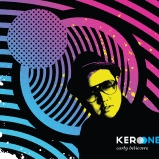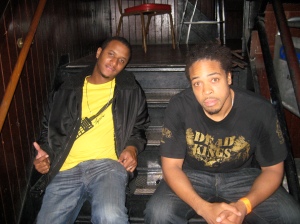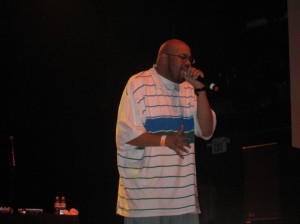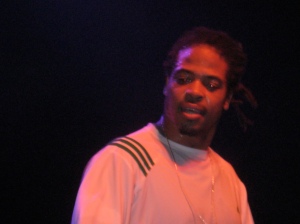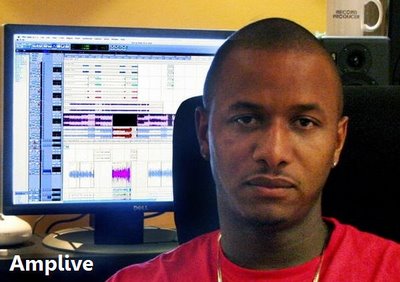AmpLive has been one of the most talented and diverse producer/DJs of the last ten years. His work as part of the
Zion I duo has exemplified an ability to bring in a variety of musical styles and genres to the hip-hop world. In addition to this work, Amp has worked with or done remixes for
Goapele,
Akon and
Nicole Scherzinger of the
Pussy Cat Dolls. He has also produced music for
ESPN‘s Sportscenter, So You Think You Can Dance?, America’s Next Top Model, and MTV’s shows Cribs and The Real World. On top of the musical creation, he has earned a Platinum Plaque for his
Linkin Park remix as well as
The Guardian‘s “Best Producer in the Bay,” and
San Francisco Weekly‘s “Best Hip Hop Group in the Bay” awards. AmpLive’s recent release,
Rainydayz Remixes, a remix album of the
Radiohead album
In Rainbows, has received considerable press, word of mouth, and
excellent reviews. The mash-ups, utilizing and remixing pieces of the original album, received Radiohead’s blessing to be distributed for free. Because of the
MixMatch nature of this album and the various production, distribution and copyright issues associated with such an undertaking, we thought it was about time to catch up with Amp and talk to him about his musical history and future, his run at the Radiohead album, and the future of the music industry and distribution models in general. Below is the interview Amp granted to Evolving Music to talk about these issues. Insert gratitude and round of applause here…
AC: Your music and production, from Mind Over Matter to Heroes in the City of Dope, always exhibits a huge variety of sounds and influences from different genres that speaks to a diverse musical enjoyment. What genres catch your ear, what is the foundation of your personal musical enjoyment, and when starting out on songs, is it a conscious effort to bring these genres in, or are they embedded and just come out in your music?
Amp: Well, I grew up exposed to different types of music. I am from Texas, so I was surrounded by country music. I played the drums at my church, listened to hip hop, skate punk and techno in middle school, took piano lessons, and was forced to watch the local symphony at least twice a month. So I look at music as a big bubble. All genres catch my ear. I feel that you can find something good in everything. When I am creating songs, I generally go off the feeling that I have or the point I want to get across versus thinking of the genre that it would be in.
AC: Zion I, at various times, has brought in collaborating MCs and producers. For Heroes in the City of Dope, Grouch was brought on for the entire album. What process do you use when determining who you’d like to work with on upcoming tracks? When you do collaborate, is there a set formula you like to use for combining with another musician, or is it a more organic process? How have your collaborations contributed to your personal growth as an artist, and do you find yourself revisiting methods you picked up from people you’ve made music with in your own?
Amp: Collaborations and observation has definitely helped me grow as a producer. When I first started in the early 90s, Spearhead X, who was a producer for Dallas Austin, taught me how to tighten my drums. While L Rock, who now is a main producer in Lil Jon‘s camp, helped with musical arrangements and learning how to play. So as I evolved and started becoming a professional years later, I took these experiences and applied them to my music. So in doing the collaboration album, Heroes in the City of Dope, I wanted to make sure there was equal input from everyone. For that album Grouch and I gave approval on the beats and the songs as they were finished. So we both had our touches on the music, even if I produced the track.
AC: Is there one genre that you most enjoy incorporating in your music, and is there any sound you’ve been wanting to work in a song that you haven’t done yet?
Amp: Hip Hop music is my basis and in my soul, so that will always be incorporated into my music. I have always wanted to do a song using a harp. Hopefully in the future that will happen!
AC: Obviously your remix of In Rainbows demonstrates an appreciation for the album. How long have you been a Radiohead fan, what initially introduced you to their music and which is your favorite song and album? Now that they’ve proven amenable to your remix effort, are you considering working on any of their other work?
Amp: Ive been a Radiohead fan since the late 90s. “Karma Police” from the album Ok Computer was what set it off for me. Even though that was their hit song and everyone liked it at that time, the hip hop feel and knock of it captured me. Then their sound got more electro and I really started getting into them. I would have to say that before In Rainbows, Kid A was my favorite album. I just think they are off the hook because they successfully push the envelope at all times. I would definitely do more remix work, just approach it differently next time.
AC: The growth of collaborations when it comes to mash-ups is something that has really been quite fast over a relatively short period of time. Was this the first time you had thought about doing something like this, and what prompted you, over any other music you might currently be listening to, to work with this album?
Amp: Well, I have always done remixes and twisted up music. I did my first mashup cd about a year ago, Beats, Remixes, and a side of Mashups, where I took all kinds of vocals, including old Zion I a cappellas, and combined them with different music. It got a really good response and people were telling me that they liked it better than the normal mashups. Thats why I thought that I could do this well.
AC: There are a few songs, “Bodysnatchers,” “House of Cards” and “Jigsaw Falling Into Place,” from In Rainbows that you didn’t work with on the Remixes. What made you decide to work with the tracks you did?
Amp: Well, for one timing. I had started working on a remix for “House of Cards” and “Bodysnatchers,” but there wasnt enough time to finish and do what I wanted to do. Especially “Body Snatchers.” Man, that song is good!! I just messed with the songs that I felt were the easiest to remix first.
AC: Initially you received a Cease and Desist for these tracks. What was the progression from that letter to Radiohead allowing them to be distributed? Was it a process that went on through the labels, or through you and the band?
Amp: Basically, after the cease and desist came, we reached out to Radiohead. After sending them the songs and listening to them, they gave an ok for the release.
AC: What are your thoughts on the method of going without a label to start, allowing consumers to pick the price of the album and providing it for free as Radiohead did with In Rainbows? You’ve also now released and received considerable press from your remixes being available for free. What is your view of this change in distribution, and where do you see the traditional label industry heading in the next five years?
Amp: I think that it was ground breaking how they decided to do that. It was giving back to the fans who have been supporting them. By giving the album away for free at first and then offering it for sale later was saying that “for all of the people who have been supporting us, we will give you first dibs on the new record”. I think that shows respect. I think the industry is changing, but I dont know the end result. I do feel that groups will have to do more than just rely on their music for income. The song is going to be more of a business card than a product. A group’s show and merchandise are going to be the new product. I think that the traditional label is going to combine with management and marketing formats. It will be all in one.
AC: I think your description of the song as a business card for musicians is a very solid one. I think a lot of people believe that with iTunes now being the second largest music distributor in the world and songs being sold for a dollar, artists are seeing more revenue from the sale of their music. Is this a true assumption on the part of the consumer? And could you address how the change in format and distribution has altered your income from the release of Mind Over Matter, which was primarily CD and word of mouth, and has since been released on iTunes, to later albums that were released on iTunes immediately? What DOESN’T the consumer know about artist profits from their music distribution?
Amp: Well, the biggest misconception is that the artists are making more money because of iTunes. What consumers (and artists actually) need to realize, is that it takes money to make money. Having your music on iTunes is only going to sell it if you are able to spend the proper amount of money and have a working staff of people to promote where to find your music. This is where a record label or promotions company comes into play. I have always been independent so the way i see my revenue hasn’t changed as much. Because I have been putting out albums since 1997, I have been able to build a fan base that has followed my music from the CD to the digital era. So things have been consistent, in terms of the career of Zion I.
AC: In your music, what is currently holding the most interest for you and what has brought you the most enjoyment recently? You’ve been doing DJ sets now, how do these differ for you in preparation and presentation from your shows as Zion I? Is there any work being done on a new album?
Amp: Definitely doing the Rainydayz Remixes brought me enjoyment. I also have been working with the soul artist Codany Holiday and his album is sounding tight. But most of all the new Zion I album, The Take Over, has been really tight to complete. I have been DJing for years, it’s nothing new. For Zion I I just wanted to step up the game and do more than just play tracks in the back, so I make live music on stage too. But I plan to incorporate that into my djing also.
AC: The work you do with Codany Holiday on the Rainydayz album is tight. In your work on his album, are you moving more into classical soul sounds, have you been slipping hip-hop into his soul? Talk a bit about the collaboration with him and what it’s meant for both of you in terms of releasing a soul album.
Amp: Codany Holiday (pronounced Courtney) is a naturally gifted singer. So producing for him hasn’t been hard at all. The biggest challenge was the sound we wanted to go with. I thought it was best to go with what was natural to him. When you talk to him about his mentors and what singers he admires, they range from Marvin Gaye, Donny Hathaway to Phillip Bailey (Earth, Wind, & Fire). So I definitely wanted to use more classic soul production, but hip hop with a 2009 twist to it. The response has been great. With Codany has been down with Zion I for awhile, he has been involved in alot of our songs. Working with him and producing his album was only natural. He brings alot of ideas to the table with production and arrangements. He is “the truth” in terms of gifted soul singers.
AC: Over the years you’ve been creating music, has there been one change or innovation that has significantly altered how you think about or make music?
Amp: Definitely the use of the computer and software to make music has been the big change for me. For years I just used analog equipment, ASR10, MPC, and all the other traditional machines. Now everything is on the computer and the songs are right in front of you…makes you look at music in a different way.
AC: In terms of looking at the music visually in a different way, could you talk about how that changes your approach to making the music? Do you find yourself dealing with creation in a different way now that you see the music visually and what are those differences? Would you be willing to give a description of step by step process you take, from mental idea to finished song?
Amp: Using Pro Tools and Logic has definitely made me look at music differently. Instead of seeing beats as loops, I now have the whole song mapped out in front of me. Its like looking at a song linear instead of circular. So to make a very basic song I always start with a melody or drum pattern, then build on top of that. Once I have something going in a quick loop I spread it out in the computer by repeating that part to the length of about 5 minutes. Within that I add beat changes and other sounds.
AmpLive’s creative and dynamic approach to music is amazing. His use of various genres from a musically diverse upbringing has helped the movement infusing the hip-hop genre with new sounds and broader spectrums. He is currently on tour and working on music for Codany Holiday and the upcoming Zion I release The Take Over. You can find his music through Myspace, iTunes and any other place music is sold. Evolving Music and MixMatchMusic would like to once again thank AmpLive for his time and energy in providing this interview.
